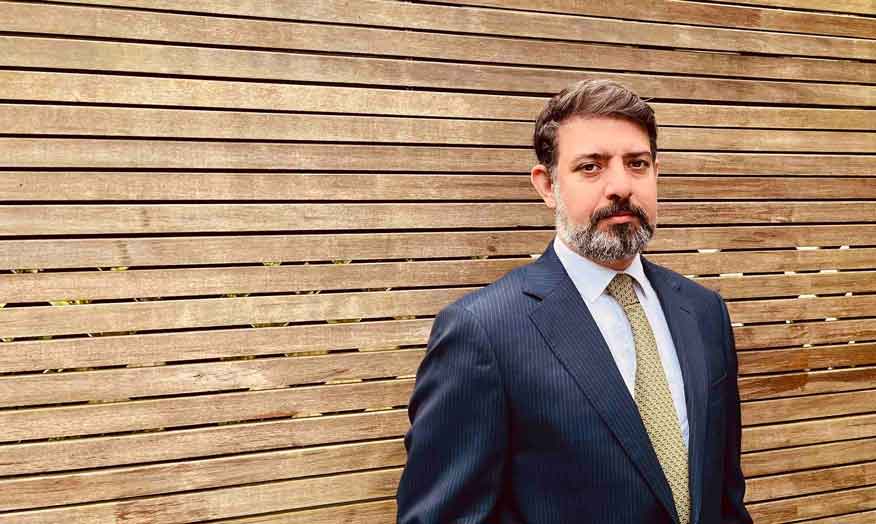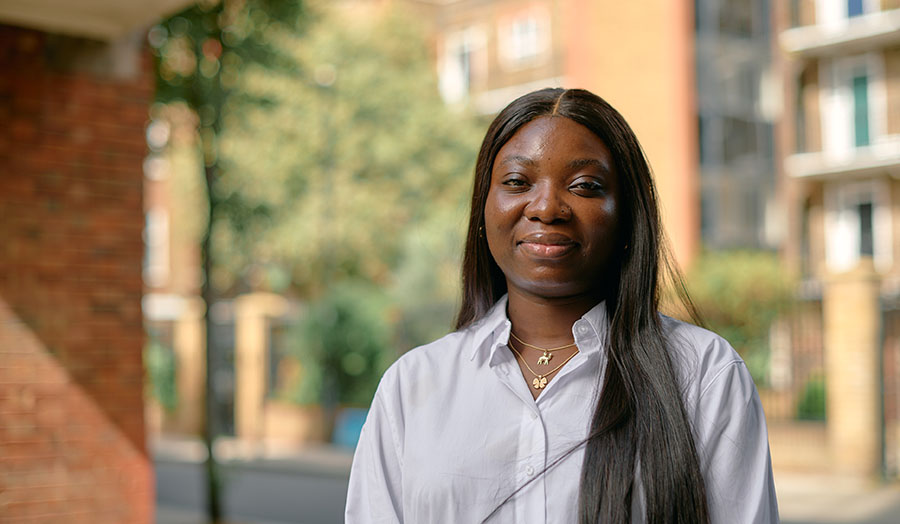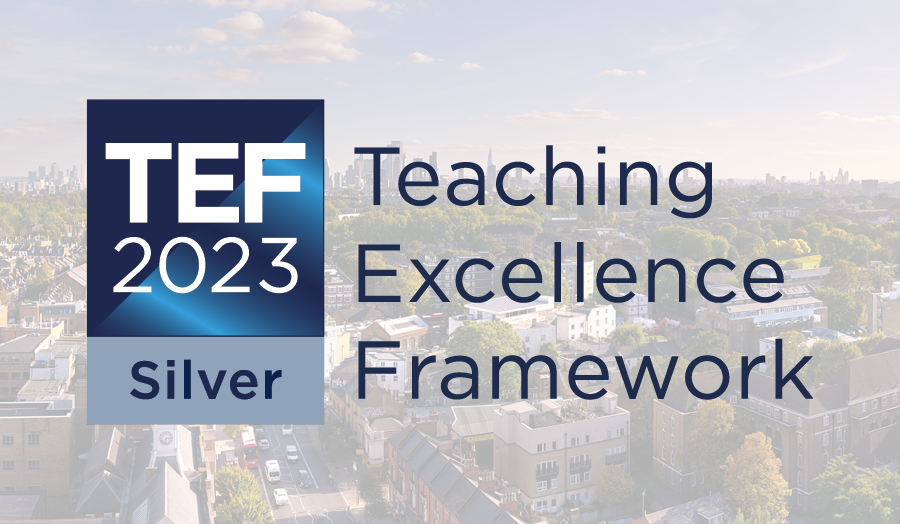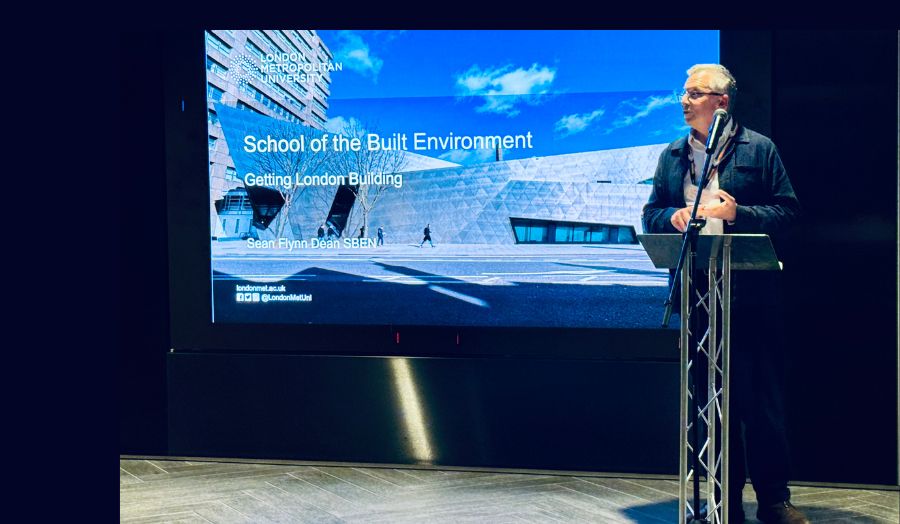Apply for this course
Please select when you would like to start:
This course is subject to validation.
Use the apply button to begin your application.
If you require a Student visa and wish to study a postgraduate course on a part-time basis, please read our how to apply information for international students to ensure you have all the details you need about the application process.
Why study this course?
If you’re looking to become a well-versed real estate surveyor, then look no further than our Real Estate MSc. Embarking on a career in property can be highly rewarding, offering plenty of exciting opportunities for you to explore.
Here at London Met, our School of the Built Environment has designed this conversion course to develop you into a top-level, highly-valued real estate professional, with the ability to tackle challenges head on. What’s more, you don’t need to have studied an undergraduate degree in real estate to apply, our MSc can be an entry route into this dynamic industry.
This MSc course will not only exercise your skills in communication and negotiation, but will also expand upon your business, critical thinking and technical skills. You’ll become an expert in all things real estate, from the development of commercial real estate, and valuation of commercial property, to acquisition, management and disposal of buildings across the globe.
Developed alongside industry partners, this course will ensure that you’re at the forefront of innovation and best practice. You’ll also gain invaluable experience on real-world projects and industry scenarios, engaging in authentic learning and assessment. You’ll have the chance to use industry standard technology and software, advancing your career prospects. All this while you study at our welcoming Holloway campus, with excellent transport links to the City and the West End.
Take a direct route into the industry
You don't have to have studied an undergraduate course in real estate to apply for our Real Estate MSc degree course
Gain practical, hands-on experience
You’ll gain invaluable experience by engaging in real-world projects and industry scenarios, as well as having the chance to use industry standard technology and software
Learn from industry professionals
Teaching will be carried out by a combination of expert academics and practitioners to ensure that you graduate with the necessary skills sought by employers
Course modules
The modules listed below are for the academic year 2024/25 and represent the course modules at this time. Modules and module details (including, but not limited to, location and time) are subject to change over time.
Year modules
Applied Research Project
This module currently runs:all year (September start) - Thursday afternoon
(core, 60 credits)
The module will provide students with the opportunity to undertake an in-depth study of a subject which is of personal and subject interest in the field of the built environment. Students may focus their research upon a topic or problem relevant to their current programme of study and based upon an academic subject of interest, their current work practice or recent work experience or placement. The submission will take the form of a dissertation.
Students are encouraged to develop their critical thinking and undertake rigorous and theoretically informed research. The module will develop the student’s understanding of the linkages between conceptual issues, subject area, and research methods.
The module will introduce students to research methods and strategies which are appropriate to their area of study. It will provide the student with experience in the planning and implementation of a research project and the subsequent writing up of research findings in a dissertation and encourage students to undertake critical thinking.
Read full detailsAsset Management of Real Estate
This module currently runs:spring semester - Thursday afternoon
(core, 20 credits)
This module looks at how real estate surveyors optimise the value of real estate, firstly through the effective management of property on a day-to-day basis, maintaining landlord and tenant relationships; and then more strategically by the management of property as a financial investment and maximising returns.
Property management of commercial real estate covers issues relating to planned maintenance, health and safety, landlord and tenant relationships, and service charges. In general, any matter associated with the smooth running of a property.
Asset management of commercial real estate considers property from an investment point of view, to maximise financial returns and includes the management of portfolios of property. You will look at matters such as lease restructuring, valuation, refurbishment programmes, obsolescence, redevelopment and adaption. You will learn about data collection and analysis and the importance of a dynamic management strategy identifying risks and future trends, to retain asset values.
Approaches to sustainability and environmental reporting will also be examined and the influence of such reporting on real estate investment.
Built Environment Economics and Finance
This module currently runs:autumn semester - Thursday afternoon
(core, 20 credits)
This module examines the built environment sector, markets, and organisations at a local, national, and international level and the impact of government economic policy and globalisation on the sector. It examines the principles underlying the relationship between economic theory and the built environment sector. You will study how the sector makes effective use of resources and how, in the move towards decarbonising our economies, the environment can be afforded protection through embedding sustainable principles in our practice.
The relationship between business planning activities and corporate objectives will be explored to gain an understanding of the essential elements of a business plan and methods for financial benchmarking. Following on from this the module will explore accounting concepts and principles and you will gain an understanding of the format of management and company accounts and how they are prepared including balance sheets, profit, and loss and cashflow statements.
Throughout the module you will consider how we can leverage big data for businesses decision making in the built environment. With the abundance of available data and analytical tools, organisations recognise the importance of effectively using it to gain a competitive edge. Through utilising data analytics and data visualisation tools, you will develop solutions to scenario-based problems and present them effectively.
Read full detailsCommercial Real Estate Practice
This module currently runs:autumn semester - Monday morning
spring semester - Monday morning
(core, 20 credits)
This module brings together your knowledge of economics, valuation, and development. You will consider property as an investment, study approaches to risk and returns, and explore various financial models for property development and ownership. You will compare property against other investment classes and appreciate the types of property investors, including the role of institutional investors in the market.
You will examine global property markets and reflect upon global financial events which have influenced or been influenced by real estate investment.
Throughout the module sustainable investment and finance will be considered. Future trends and the influence of big data and proptech will form part of the module discourse. You will be required to contribute to discussion drawing upon your own experience, research and it is important that you keep abreast of current economic issues including the performance of financial markets. The module will require you to develop strong analytical skills to apply to practical industry scenarios and to critically evaluate the investment performance of property assets. These are valuable skills which will be of benefit to your career and are competencies required for professional body membership.
Planning and Development
This module currently runs:autumn semester - Monday afternoon
(core, 20 credits)
This module is about the process of commercial real estate development and its commercial drivers.
An understanding of planning and development is essential to those working in the commercial real estate sector and increasingly growing into a specialist area of practice. Surveyors can play a vital role in promoting effective land use as a primary driver of sustainable development.
Assessing the potential to secure planning consent is a starting point in the development process, drawing together relevant policies, site history and local context for consideration. This module will provide you with the skills to understand the planning process and the influence of planning policy on development.
Using these skills, you will then examine the development process, including development aims and objectives and appraisal of the development potential of a site or the refurbishment of a building. You will gather market data in considering costs and values and employ industry standard software and datasets to appraise developments.
In considering the feasibility of a development you will examine the whole project cycle, from initial feasibility proposals, to detailed design and the construction phase, handover of the development, and ongoing asset management.
Throughout the module, social value and the environmental impact of developments will be considered and your learning will be enhanced through studying real life case studies, both within and outside of the classroom.
Real Estate Valuation
This module currently runs:spring semester - Monday morning
autumn semester - Monday morning
(core, 20 credits)
Valuation is an essential skill for commercial real estate professionals and forms the basis of financing decisions, transactional and development advice, dispute resolution and statutory applications. This module develops students’ skills in valuing commercial property applying traditional and contemporary methods of valuation over a range of contexts. The module focuses on the drivers of real estate value, the standard methods of valuation and the appropriate situations for their use, together with introducing innovations in valuation methods. You will learn the importance of market data in valuation, the sources of this data and how to validate and interpret it. Throughout the module there is an emphasis on the importance of following professional standards in this area of work and of ethical behaviour. You will be presented with authentic scenarios and examples to help with your understanding.
Read full detailsSustainable Built Environments
This module currently runs:spring semester - Monday afternoon
(core, 20 credits)
The module aims to develop a critical awareness of the background and drivers for sustainable development. It will explore the development of the sustainability agenda, different approaches to sustainable development and the key trends in society that affect, and are affected by, the built environment. It will consider how climate change, urbanisation and other factors are placing pressure on the built environment across the globe to deliver agile and appropriate responses to challenges such as accelerated climate change, extreme weather and societal change.
The knowledge gained will enable the student to understand the impact of the built environment sector on the sustainability agenda.
By the end of the module students should be able to critically evaluate the following:
- the background behind the sustainability in the built environment agenda
- drivers for change and appropriate responses
- the role of development in maintaining and sustaining the wider environment
- techniques that can be adopted to reduce our built environment operational energy demand
- the different types of infrastructure and their role in achieving sustainable built environments
- strategies to ensure energy security positioned within a low carbon energy mix


















.png)





